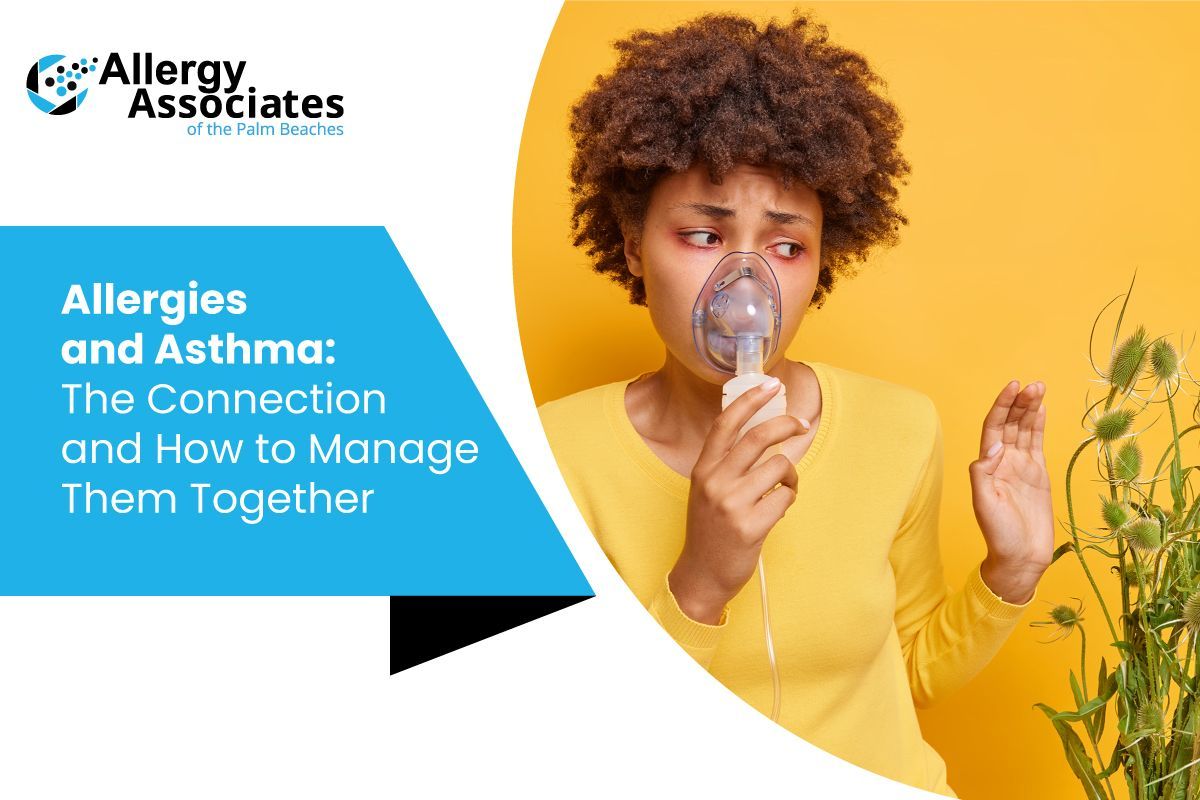
Allergies are common, affecting 10% to 30% of the world's population. Moreover, approximately 262 million individuals have asthma worldwide. Allergies and asthma are two closely related conditions. Asthma is a chronic respiratory condition causing narrowing and swelling of the airways, making breathing difficult. At the same time, allergies are the immune system's response to a foreign substance, such as pollen or pet dander. Managing these conditions together can be challenging for people with allergies and asthma.
Managing these conditions together can be challenging for people who suffer from allergies and asthma. This article will explore the connection between allergies and asthma. We will also provide practical tips on managing them together.
What Are Allergies?
To better understand the connection between allergy & asthma, let's define them first.
Allergy is a common medical condition that affects millions of individuals worldwide. It can affect anyone regardless of gender, ethnicity, or age. An allergic reaction occurs when your body's natural defenses or
immune system negatively reacts to harmless substances.
What Are the Common Symptoms of Allergies?
Below are the common symptoms of an allergic reaction.
- The feeling of being sick
- Swollen eyes, lips, mouth, or throat
- Pain or tenderness in your cheeks, eyes, or forehead
- Diarrhea
- Itchy skin or hives
- Coughing, wheezing, or breathlessness
- A runny nose or sneezing
- A clogged nose
What Are the Causes of Allergies?
Allergens are the typical culprits during an allergic reaction.
Examples of common allergens are:
- Tree and grass pollen (hay fever)
- Insect stings from bees, wasps, and yellowjackets
- House dust mites
- Animal fur from pets like cats and dogs
- Certain medicines
- Foods like peanuts, milk, and eggs (food allergy)
Now that you understand allergies better let's define asthma.
What is Asthma?
Asthma is a chronic medical condition that typically affects your lungs. This disease causes narrowing and inflammation in your airways, making breathing difficult.
What are the Common Symptoms of Asthma?
The common symptoms of asthma are (including seasonal asthma symptoms):
- Breathlessness
- Excessive coughing
- Chest tightness
- Wheezing
- Drowsiness, dizziness, confusion, or exhaustion
- Blue lips and/or fingers
- Fainting spells
What are the Causes of Asthma?
Unfortunately, despite today's medical advances, we do not know the causes of asthma. However, medical experts worldwide concluded that asthma is linked to genes, environment, and occupational factors.
Now that you know the definition of allergy and asthma, it's time to discuss their connection. The following section focuses on the relationship between the two medical conditions.
What is The Connection Between Allergies and Asthma?
Allergies and asthma are both caused by an overactive immune system. When the immune system encounters a foreign substance, it produces antibodies to fight off the invader. If you live with allergies, your immune system has antibodies in response to harmless substances like pollen, dust mites, or pet dander. This overreaction can cause various symptoms, including sneezing, runny nose, itchy eyes, and skin rashes.
If you have asthma, your body's natural defenses overreact to specific triggers, causing inflammation in the airways, narrowing them, and making breathing harder. Common asthma triggers include pollen, dust mites, pet dander, mold, and pollution. When a person with allergies is exposed to an allergen, it can trigger allergy asthma symptoms, such as wheezing, coughing, and shortness of breath.
Can allergies make asthma worse? Can allergies cause asthma? Yes. The common symptoms of allergies aggravates asthma, especially those that affect the airways.
Learning the connection between seasonal allergies and asthma gives you an idea of how to manage their symptoms. In the next section, we will discuss safe and efficient management tips.
How Do I Manage Allergies and Asthma Together?
Managing allergies and asthma together can be challenging, but it is essential for maintaining good health and quality of life. Here are some tips for managing allergy triggered asthma:
Identify Triggers
The first step in managing allergies and asthma is identifying triggers. Keep a diary of symptoms and note when and where they occur. This will help you identify the triggers that are causing your symptoms.
Avoid Triggers
Once you have identified your triggers, try to avoid them as much as possible. This may mean keeping your home clean and free of dust, pollen, and pet dander, wearing a mask while cleaning or gardening, and staying indoors on high pollen count days.
Use Medications
Several medications are available to manage allergies and asthma. Antihistamines can help relieve allergy symptoms like sneezing, itching, and runny nose. In contrast, bronchodilators can help ease asthma symptoms like wheezing and shortness of breath. Allergic asthma treatments are safe and efficient.
Follow Your Treatment Plan
Following your treatment plan as your allergy doctor prescribes is essential if you have been diagnosed with asthma or allergies. This may include taking medications, using inhalers, and monitoring your symptoms. The treatment plan depends on your condition and reaction to the prescribed medications.
Get Support
Living with allergies and asthma can be challenging, and getting support from family, friends, and healthcare providers is essential. Involve your family and friends to ensure faster coping and recovery.
Additional Tips
You can also try home remedies for managing allergies and asthma. These techniques often provide safe and efficient relief from asthma and allergy symptoms.
Honey
Honey contains natural anti-inflammatory and antibacterial properties that can reduce swelling in the airways and relieve asthma symptoms. It can also help soothe coughs and sore throats caused by allergies. Mix a teaspoon of honey with a cup of warm water and drink it daily to help manage asthma symptoms.
Ginger
Ginger is ideal for treating various ailments, including asthma and allergies. It contains compounds that help reduce inflammation and relax the muscles in the airways. Drink ginger tea or add fresh ginger to your meals to help manage your symptoms.
Turmeric
Turmeric contains a very potent anti-inflammatory compound called curcumin. It can help reduce inflammation in the airways and relieve asthma symptoms. Include turmeric in your meals or drink turmeric tea to help manage your symptoms.
Eucalyptus Oil
Eucalyptus oil contains natural decongestant properties that can help relieve nasal congestion caused by allergies. Combine a couple of drops of eucalyptus oil with a glass of warm water and inhale the steam to help clear your nasal passages.
Apple Cider Vinegar
Apple cider vinegar contains natural antihistamine properties that can help reduce allergic reactions. Add one tablespoon of apple cider vinegar with a cup of water. Drink it daily to help manage your allergies.
Manage Allergy and Asthma With Evidence-Based Methods
Allergies and asthma are two conditions that are closely related and often occur together. You can successfully manage allergies and asthma by identifying and avoiding triggers, using medications, following your treatment plan, and getting support. We understand the difference between asthma and allergies. That is why we are confident in providing you with effective treatment and management.
Our board-certified allergy doctors specialize in treating and managing allergies and asthma using
evidence-based methods. Contact
Allergy Associates of the Palm Beaches today if you are looking for allergists.
Click
here to book an appointment.
Allergy Associates of the Palm Beaches
Allergy Associates of the Palm Beaches | All Rights Reserved.










